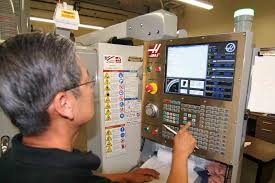 |
| Typical machining operation |
NC machining has it's challenges. An NC operation must be defined by an NC programmer. It is is paramount that the NC programmer be sufficiently skilled and experienced to accurately program the correct steps required to complete the task. A thorough check (and possibly trial machining pass) be performed prior to working on a production part. In my time at Boeing there were several instances where the NC program erred and cost valuable time and money. One such instance involved a composite tape-laying machine that was incorrectly programmed. The head of the machine drove into a composite wing and created a gouge 0.5 inch deep. Repairing the panel required many hours (and significant financial resources) to bring the wing back to conformance.
There are also other issues. Obviously machines break down occasionally due to high usage. A good maintenance plan will eliminate most problems. But when a machine breaks down, it's best to have a qualified and available person(s) available to fix the issue. This is a good argument for owning an older model machine and not the latest version. There is a lot of history and knowledge with older machines and this helps speed the repair process if outside consultation is required.
Of course an operation needs qualified machinists/operators to run the machine. More importantly the machinist has to know at a moment's notice to stop the machine if something appears wrong. Bringing new people on board to an operation should include a transition where the experienced operator will help guide the new operator through the process.
 |
| Manual NC programming |
No comments:
Post a Comment